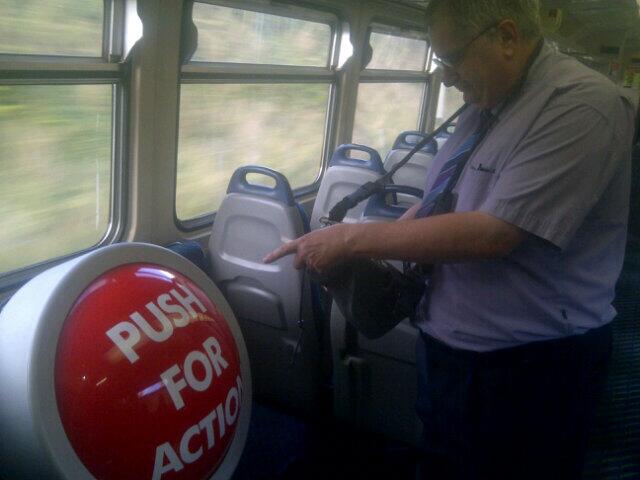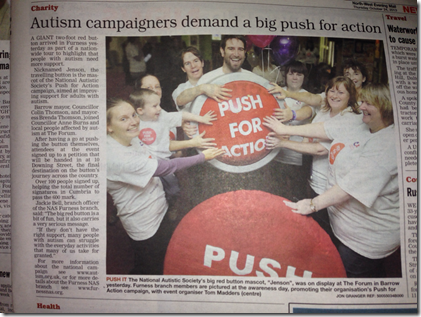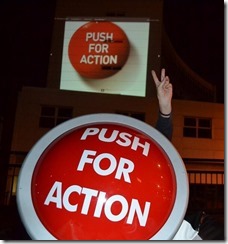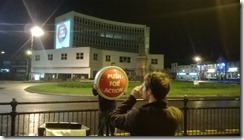At our Push for Action reception in parliament earlier this month, we heard from two people affected by autism. Sam spoke about the challenges she had faced trying to get adequate support for her brother, Indi. Chris then told us about his own experiences, pre- and post-diagnosis. Read his incredible story, beautifully told, below:
 "My name is Christopher Goodchild and I have
an autistic spectrum condition.
"My name is Christopher Goodchild and I have
an autistic spectrum condition.
"I might look quite ‘normal’
to you but it has taken me many years to acquire the skills I have now. My
adapted skills were acquired through necessity and refined through adversity –
a matter of sheer survival.
"Imagine being able to see,
feel, taste and touch the world around you with such intensity and longing, and
yet for the most part, this very world remaining beyond your grasp. Like being
in the desert and led to a well that you cannot quite drink from.
"Being high functioning within
the spectrum can feel like climbing high above the imprisoning walls of autism,
only to see what you can’t quite have and most others take for granted. The
truth can be so humbling when it’s just beyond your reach. Depression was for
me an inevitable consequence of aching to be part of this world that has
forever been an enigma to me. I spent my childhood feeling misunderstood by my
family, teachers, and doctors. School was meaningless to me – I was labelled as
having learning difficulties and was isolated from the rest of the class. Like
many people on the autistic spectrum I process information in a very different
way to the average person.
"I was institutionalised as a
teenager because I was severely ill with depression. Being told daily I was
odd, abnormal, and weird or just plain mad. High-functioning autism (HFA) was
not common knowledge then.
"Self-harming, cutting my
arms, was my way of putting on the outside what I felt on the inside, externalising
the inner torment of not being seen and understood. The cost of concealing my
inner world so convincingly as to appear so ‘normal’ was always paid for with
depression. I experienced great loneliness and extreme anxiety and was
constantly confused and overwhelmed. I was crushed by the cloud of unknowing
why I was the way I was, I could not move forward until I knew what held me
back. When I was finally diagnosed with
ASD in 2007 it was like being given a pair of gloves and being told, “Here, I
think you will find these are a perfect fit” – and they were. This was a
turning point in my life, whereby for the first time I was able to handle
myself with care, living more creatively within my limitations and more
abundantly through my gifts.
"The NAS supported me in
finding a private evaluation for HFA, as there were limited options available
for me, and also provided me with options for post-diagnosis support. Diagnosis
was not a label; it was a moment of enlightenment. It gave me my dignity and
the chance to live a more dignified life. It saved my life. The facts are kind.
The denial of the facts can be very unkind indeed.
"My first book, ‘A PainfulGift – The Journey of a Soul with Autism’ published within two years of my
diagnosis, outlines my life and explores how autism through being a hidden
disability, can so easily render us invisible
people. We can become invisible people because our presence is ignored
and our behaviour misunderstood.
"My role as Ambassador for the
NAS is to help raise awareness of this on-going struggle, alongside the
enormous gifts and insights that we on the autistic spectrum can offer the
world. Autism is not just about suffering; it’s about being alive in an
extraordinary way and is as much part of humanity as the capacity to
dream. Autism is about having a pure
heart and finding a way to engage with this heart within a world that often
seems so cold and distant.
"Whilst I may have found grace
through suffering, many with autism and their families have been crushed by it.
It is for this reason that I am here before you today and that all my writing
is dedicated to those with autism and those who are less fortunate than myself."
 The Director of the Autism Research Centre in Cambridge, Simon Baron-Cohen, has spoken out about the "patchy" services for adults with autism and the lack of progress in implementing the Autism Act's adult strategy across the country.
The Director of the Autism Research Centre in Cambridge, Simon Baron-Cohen, has spoken out about the "patchy" services for adults with autism and the lack of progress in implementing the Autism Act's adult strategy across the country.






